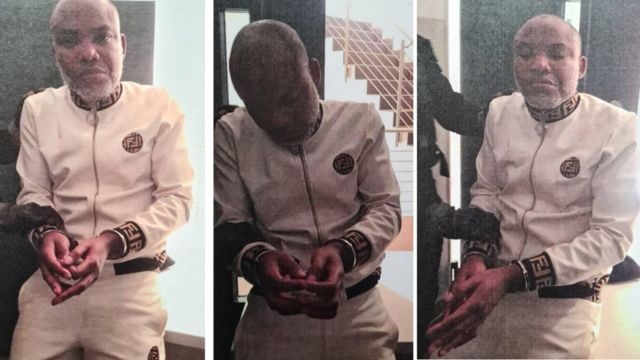
According to official record, Nnamdi Kanu is still in Kenya.
This is according to information released by the special counsel to the leader of the Indigenous People of Biafra, Aloy Ejimakor on Monday.
Ejimakor said this is the true position of things following the public denial by the Government of Kenya of its involvement in the abduction of his client in their country.
According to Ejimakor, there were no extradition, expulsion or deportation proceedings against Kanu anywhere in Kenya.
He further stated that the Kenya Government asserts that its official records show that Kanu is still in Kenya.
Ejimakor made this claim in a letter addressed to the Attorney-General of the Federation and Minister of Justice, Abubakar Malami.
The counsel to the IPOB leader added that Kanu has life-threatening health conditions, which had been aggravated by the mental and physical torture he was subjected to.
The letter reads, “the Government of Kenya (GOK) has publicly denied complicity and involvement in the said abduction, disappearance, torture and extraordinary rendition of our Client and asserted in judicial proceedings that there were no extradition, expulsion or deportation proceedings against our Client anywhere in Kenya. In particular, GOK asserts that its official records indicate that our client is still in Kenya.”
According to the counsel to the IPOB leader, “Our client has life-threatening serious health conditions, namely: heart disease and hypertension, which have been dangerously aggravated by the mental and physical torture he was subjected to.
“It is our considered position that the totality of what happened to our Client as enunciated above unarguably met the definition of Torture under Section 2 of the Anti-Torture Act, 2017, which also states at Section 9(1) that “A person who contravenes section 2 of this Act commits an offence and is liable on conviction to imprisonment for a term not exceeding 25 years”.
Ejimakor called on Malami to prosecute everyone directly or indirectly involved in the torture of Kanu irrespective of the severity of his offence levelled against him.
He said, “It is our further position that regardless of the severity of the offence alleged against our Client, there is absolutely no justification for the egregious torture our Client endured. Section 3(1) of the Act provides that “No exceptional circumstances whatsoever, whether a state of war or a threat of war internal political instability or any other public emergency, may be invoked as a justification for torture”.
“In view of the foregoing, we hereby make the following Prayers: that, consistent with the provisions of the Anti-Torture Act, 2017, the office of the Attorney-General take prompt measures to initiate the prosecution of all persons that were directly or indirectly culpable in the torture of our Client. For your ease of reference, Section 5 of the Anti Torture Act provides that: “(1) A person who has suffered or alleges that he has been subjected to torture shall have the right to complain to and to have his case promptly and impartially examined by a competent authority.
(2) The competent authority under subsection (1) shall take steps to ensure that the complainant is protected against all ill-treatment or intimidation as a consequence of his complaint or any given evidence”.
“That, said prosecutorial action be levied in line with Section 8 of the Anti Torture Act which provides that “(1) A person who actually participates in the infliction of torture or who is present during the commission of the act is liable as the principal.
“(2) A superior military, police or law enforcement officer or senior government official who issues an order to lower-ranking personnel to torture a victim for whatever purpose is equally liable as the principal.
(3) An order from a superior officer or from a superior in the office or public authority shall not be invoked as a justification for torture.
(4) The immediate commanding officer of the unit concerned of the security or law enforcement agencies is held liable as an accessory to the crime for any act or omission or negligence on his part that may have led to the commission of torture by his subordinates”.
Conclusively, Barr. Ejimakor drew the attention of Malami to the provisions of Section 1 of the Anti-torture Act, which states that the government shall: “ensure that the rights of all persons, including suspects, detainees and prisoners are respected at all times and that no person placed under investigation or held in the custody of any person in authority shall be subjected to physical harm, force, violence, threat or intimidation or any act that impairs his free will and fully adhere to the principles and standards on the absolute condemnation and prohibition of torture set by the Constitution of the Federal Republic of Nigeria and various international instruments to which Nigeria is a state party.”





